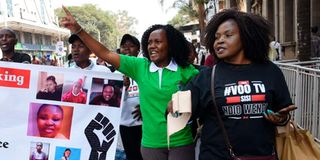Africa, Gulf seek end to suffering of migrant workers

Kenyans demonstrating on the streets of Nairobi on May 19, 2022, protesting against the murder of a Kenyan domestic worker Beatrice Wauruguru in Saudi Arabia. The government will establish safe houses to rescue distressed Kenyans in foreign countries.
African countries have established a platform to negotiate the welfare of migrant labourers to the Gulf countries in the latest step meant to end the suffering of workers and protect their welfare.
The platform established last week in Qatar is known as the Doha Dialogue, named after the Qatari capital, and saw various African countries including the Horn of Africa launch a coordinated means to discuss labour policy, health and safety issues for migrant labourers.
It came after the two sides issued some kind of a declaration from both sides; African Union member states and several Gulf Countries that have subscribed to it, to regulate labour mobility and weed out incidents of suffering by ensuring only those needed can come.
It is the outcome of a two-day meeting on May 22 where hosts Qatar, United Arab Emirates, Bahrain, Saudi Arabia, Oman, Qatar, Kuwait, Jordan and Lebanon pledged with the African side.
The African countries included all East African Community member states; Uganda, Tanzania, Kenya, Burundi, Democratic Republic of Congo, South Sudan and Somalia as well as Algeria, Libya, Sierra Leone, Botswana, Republic of the Congo and Djibouti agreed to it. Other countries included Egypt, Ethiopia, Ghana, Morocco, Nigeria, Cameroon, South Africa, Tunisia and Zambia.
Labour migrants
Though not legally binding, and is to work as a voluntary platform, the officials from both sides say the forum could generate expert opinions that both sides can adopt to safeguard labour migrants within international law.
African countries are among the biggest contributors to semi-skilled and unskilled labourers to the Gulf countries, owing to the latest rising demand for their work. But critics had always said gaps in labour rights and welfare protection allowed their employers leeway.
Rights watchdogs such as Human Rights Watch had accused Gulf countries of refusing to adjust to international labour law standards.
African labour unions, however, have welcomed the Dialogue as an important step to help protect migrant workers in the Gulf.
“However, what is important is for the implementation arrangements and processes to be clearly and effectively set out, which the Terms of Reference (ToR) describes,” said Akhator Joel Odigie, General Secretary of the International Trade Union Confederation-Africa, the continental grouping of labour unions. The terms of Reference were expected after a month of the declaration.
“The Doha Dialogue is an excellent step in the right direction to utilising social dialogue to improve labour migration governance between the two regions. Partners in the dialogue, including social partners, must be provided technical support to ensure inclusive, collaborative, and effective implementation,” he said.
African countries aren’t the first to start such a joint move and could be playing catch-up to Asian countries who usually negotiate through what is called the Colombo Process.
Semi-skilled workers
Labour unions want a similar arrangement which they argue helps countries negotiate uniform welfare and rights including pay, safety and health, as well as coordinating meetings of labour experts.
The fragmentation in Africa, argued Mr Odigie, has only fueled competition, allowing recruiters to get workers on the cheap without committing to their welfare. It also means African countries have not focused on common issues of labour mobility or even targets. Some countries like Kenya have been encouraging both skilled and semi-skilled workers to seek work abroad. But they have not yet discussed wages and other terms for them abroad.
“Africa needs to avoid the race to the bottom and position its engagement with the GCC (Gulf Cooperation Council), Lebanon, and Jordan in ways to ensure better protection for their people,” he said this week. The GCC is the bloc for Gulf countries.
“Labour Migration is a response to the realities of the ever-dynamic global labour market. Migrant workers as supply-side responses to the labour demand gaps do not and should not lead to their commodification.”
Doha declaration
The Doha declaration was signed by ministers of labour from both sides. But they may have to work with labour unions and UN agencies such as the International Organisation for Migration and labour bodies like the International Labour Organisation to develop a tangible document that will be legally binding.
The ministers, however, did admit that labour migration from Africa to the Gulf has only recently become a problem after numbers increased as demand rose. Yet they agree that formalising labour movements can benefit both sides.
“Improving labour mobility management and the contractual work cycle and enhancing fair and ethical employment for workers between Africa and GCC countries, Jordan and Lebanon are objectives that both regions share.,” the declaration says.
“The Doha dialogue will contribute to resolving many labour migration issues facing both sides.” Skills development, certification and mutual recognition of skills and qualifications, recruitment, occupational safety and health, access to justice, use of technology to improve outcomes of labour migration, and other common issues.
The Doha Dialogue is supposed to be state-led, but will also be consultative and include stakeholders such as labour unions, labour rights organisations, the UN, regional blocs, and employer organisations. It will have a secretariat based in Doha.





